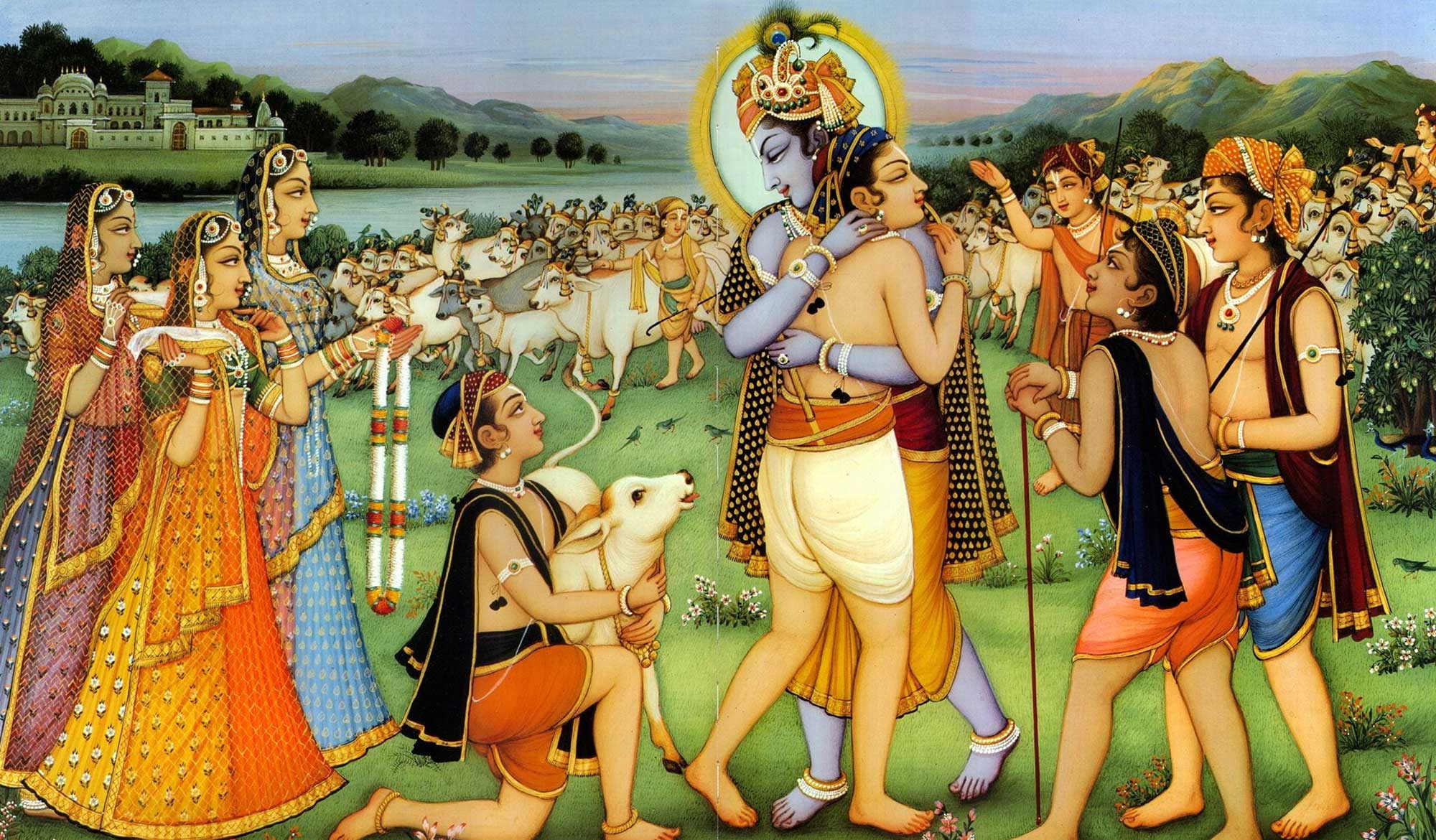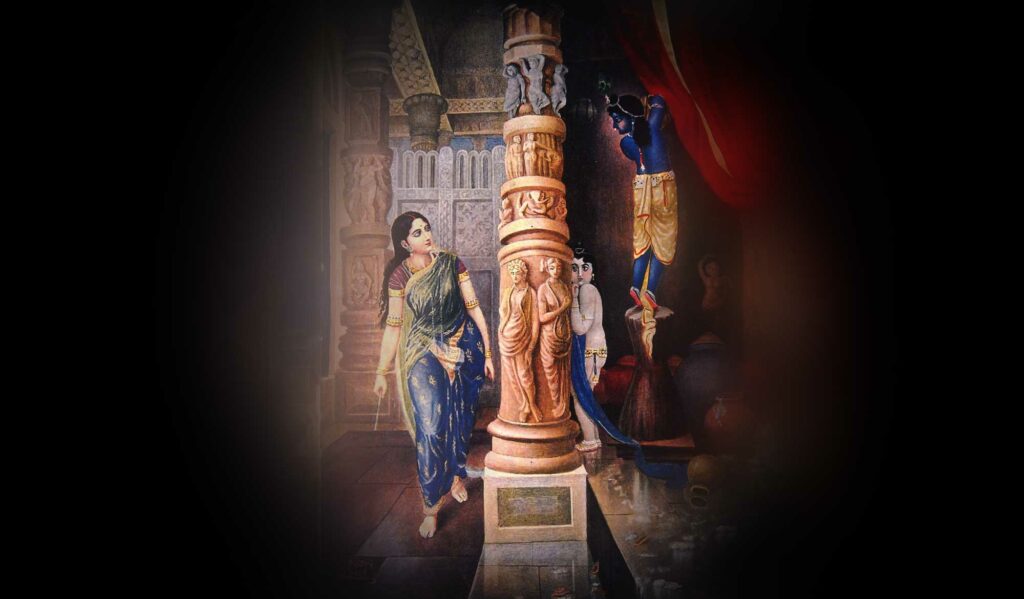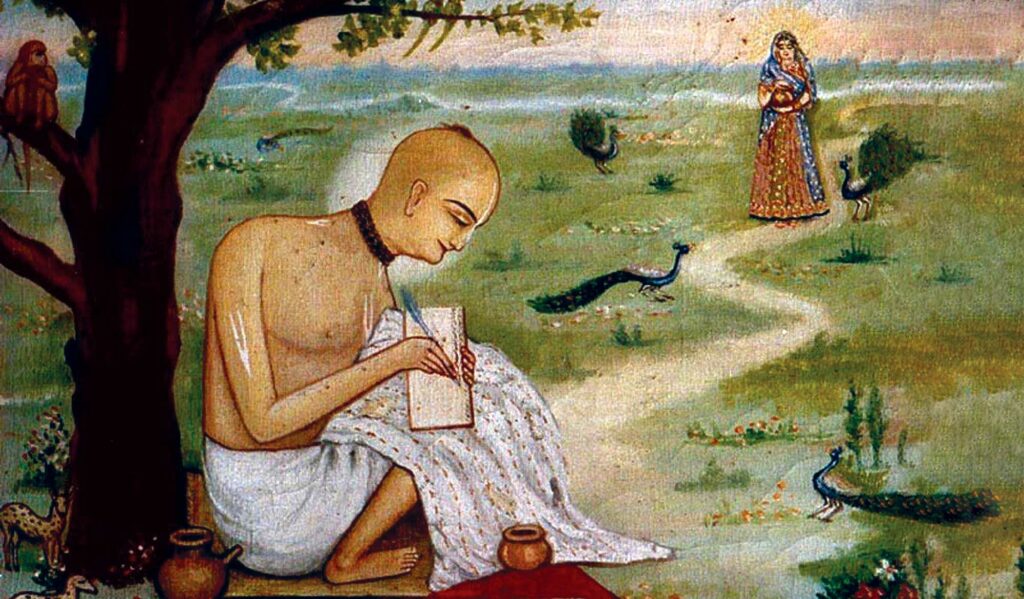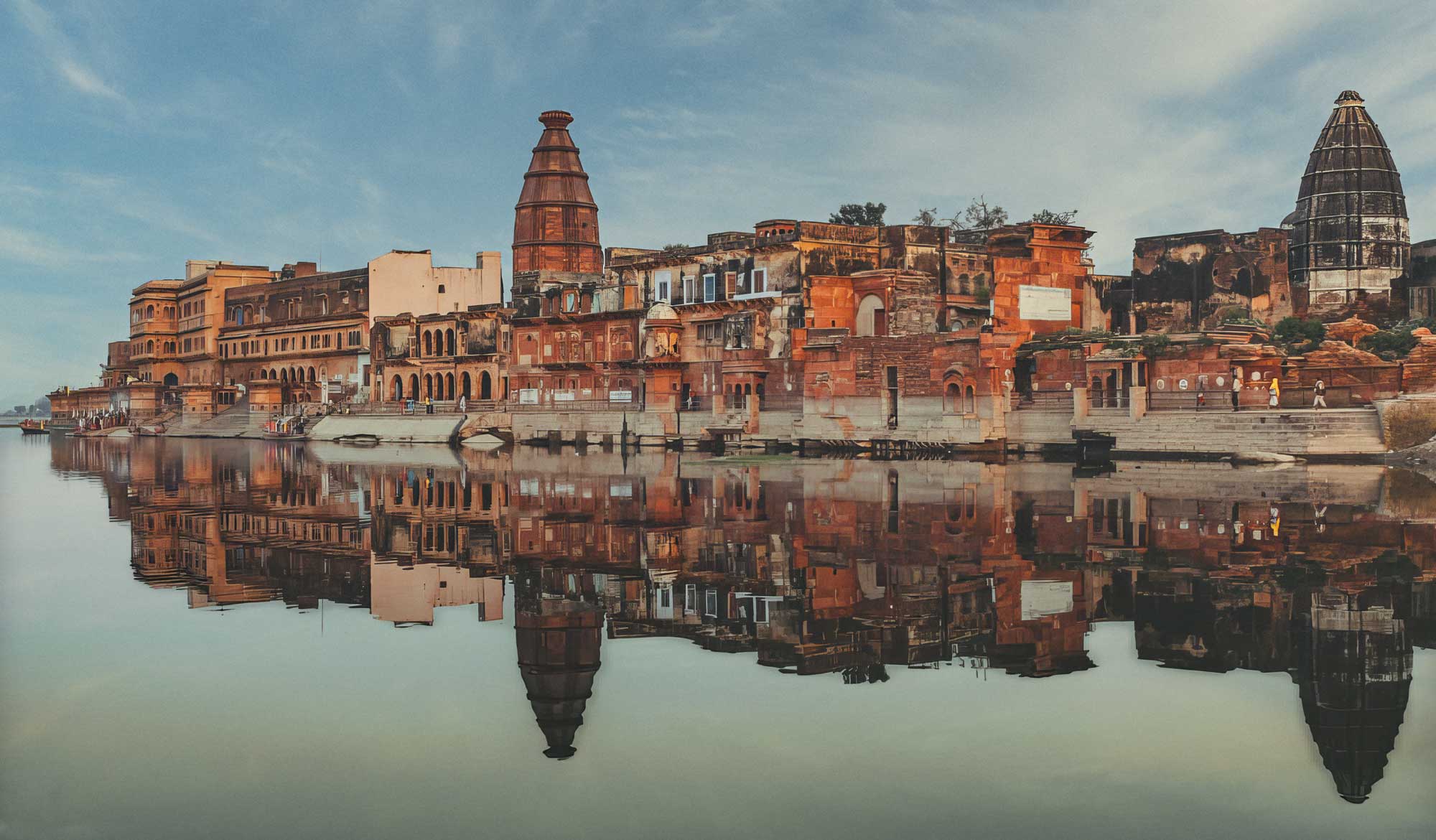Overview
A devotee expresses a doubt concerning the English word ‘love’ used in a translation of an article by Śrīla Bhaktivinoda Ṭhākura. In his reply, Gaura Gopāla Dāsa Brahmacārī defends its usage and clarifies the Ṭhākura’s explanation of love.
Question: I was reading Bhaktivinoda Ṭhākura’s article Saṅga-Tyāga 🔗 on your website and came across the following statement:
One should behave with ordinary people as one externally behaves with a stranger while buying something in the market. The same dealings with a pure devotee of the Lord should be done out of love. If one is obliged to feed hungry people, needy people, and teachers, he should do so as a host dutifully cares for his guest, there is no need to exhibit love. Care for them, but not out of love.
I personally have some reservation about the phrase, “not out of love.” What does the original Bengali say? Are there different ways to translate the word which has been translated as ‘love’? Bhaktivinoda Ṭhākura is exactly all about love. To perform any act without love would go against his character and transcendental instructions. When dealing with non-devotees, e.g. giving in charity etc, it should be done without material attachment. The aim should not be to feel particularly gratified. This creates attachment based on bodily identification. The type of ‘love’ based on the body is actually more properly termed lust. But in the above translation it appears that no love should be given. Care however is a form of love. Moreover a Vaiṣṇava always feels mercy for any jīva, which is also an aspect of love. Therefore to handle anything without love would be completely uncharacteristic to a Vaiṣṇava.
Answer by Gaura Gopāla Dāsa: In this article, the Bengali word translated as love is prīti, and the particular section you have quoted is very clear. In Bengali it says, prīti viśeṣa karibāra prayojana nāi. Yatnakera kintu prīti kari-u nā (‘there is no necessity of exhibiting love. Care, but not love.’). We are not ‘interpreting’ the words of Bhaktivinoda Thakura. His Bengali is not so archaic that it requires any interpretation as is the case with classical Vedic Sanskrit. He is writing in the colloquial Bengali of the time and his own translation of the word prīti in his English works is ‘love.’ Not only that, but many ācāryas in our line translate this word in the same way. There is no other interpretation of this word, so it has been presented as it was written.
In regards to the word prīti, Bhaktivinoda Ṭhākura is referring to the highest type of love possible. There are degrees of love, some being mundane and some spiritual. Even in mundane love there are gradations. The love I may show to a friend will not be the same love I show to my own son. The same goes for spiritual love. Bhaktivinoda is specifically speaking about spiritual love in this context.
These types of writings by Vaiṣṇava ācāryas are all about context. It is good to know more about the overall mission of the man behind the writing – it helps to give context. Some of it is based upon śāstra and some is based upon his own experiences and realisations throughout the different stages of his life. Here in this particular article, Bhaktivinoda Ṭhākura is making a distinct differentiation between the ordinary dealings in your daily life and your highest spiritual pursuits. He is also qualifying something for those Vaiṣṇavas who may misunderstand these quotations from scripture. A fanatic may think that a statement such as asat-saṅga-tyāga (rejecting the association of non-devotees) means that one should never associate with non-devotees whatsoever. Instead, what he is saying is that you should show care and duty in your ordinary dealings and reserve your love for the devotees and God Himself. In the Vaiṣṇava philosophy of Śrī Caitanya Mahāprabhu it is understood that the individual jīva soul is finite. The jīva is capable of showing love, but it is limited; so with our limited capacity we reserve it for our highest ideal.
I think the question that can be posed against any of our assumptions concerning Bhaktivinoda Ṭhākura’s intended meaning is this – is this action/activity/relationship increasing your illusion and attachment to your present body? Is it taking you further away from the understanding of your true nature as soul, as nitya-kṛṣṇa-dāsa? You may have compassion, care and duty in other relationships, but love goes two ways. It is an outgoing and incoming current. You are affected by the those that you love. You are taking the association of those that you love and, depending on with whom and what that relationship is, it will increase or decrease your bodily attachment. If you use the same word ‘love’ for everything and everyone, then it becomes a reductionist interpretation of what is being said. In regards to materialists, Śrīla Bhaktivinoda Ṭhākura has specifically said ‘care’ (yatnaka) and not ‘love’ (prīti). You argue that care is a form of love and that is quite true, but only in a general sense. As I mentioned previously, Bhaktivinoda is speaking about that love which is specifically tied to our devotional life, to Kṛṣṇa.
Concerning your point about love and lust, I think it is not always so clear. Love for one’s children or friends is not stemming from lust, but unless they are somehow integrated into your higher ideals of spiritual attainment then they will naturally increase your delusion about who you really are. You have had unlimited mundane relationships through unlimited lifetimes but cannot remember any of them except the one that you are presently experiencing. So according to our capacity we should try to integrate our relationships into our conscious endeavours towards devotional ideals. It may be a question of semantics on what you understand love to be, but regardless, this simple point is there, hidden behind the language – is my illusion increasing or decreasing? Am I seeing the jīva souls around me as part and parcel of Kṛṣṇa, or am I seeing them as mine? My friend, my son, my wife etc.
In another article, appropriately entitled Prīti (Love) 🔗, Bhaktivinoda Ṭhākura concludes:
The soul in this world has forgotten his own identity because he identifies with matter. He forms various relationships with various people and behaves towards them in various ways. He identifies himself with his subtle body, and has imagined a new body consisting of mind, intelligence and ego. Because of that relationship with his subtle body, he values psychology and material science, considering them his wealth, and consequently becomes deluded. Moreover, on account of identifying himself with his gross body, consisting of the five elements, he thinks “I am a Bhaṭṭācārya” or “I am a gentleman”, and thus he lives a life of abandon. He is sometimes born and he sometimes dies. Sometimes he is unable to contain his joy, and sometimes he is stricken with grief. Glory to this transformation and glory to Māyā’s games! Sometimes the soul is born as a man and marries a woman, and sometimes he is born as a woman and marries a man and establishes for himself a large cycle of worldly concerns. When he enters that cycle he honours his superiors and takes care of his dependants. He fears the ruler, and he hates his enemies. He fears disgrace and criticism when he is born as a woman in a respectable family. He remains far from his true identity when he establishes these false relationships in this world. What a horrible condition the soul endures in such a self-imposed life! Considering the various established rules of this world as his master, he has completely forgotten his eternal master, Kṛṣṇa.
We are extremely susceptible to our environment and our association – indeed, we are products of our environment. However, we should try to adjust our vision and understand the point of view of personalities such as Śrīla Bhaktivinoda Ṭhākura. This will help us enter into what they are actually trying to communicate. Otherwise, we will become bound to the modern interpretations of what we think they should have said, based upon our current prejudices and social environment. We should not interpret the words of our predecessors but rather try to realise the very essence of what they are saying regardless of the language used. This is a very high ideal being promulgated by our acaryas and it will not be achieved either by blind fanaticism or a half-hearted approach. Our hearts must be fully invested in this because when the time of death arrives nothing else will matter. Love for Kṛṣṇa transcends our temporary mortal experience while everything else is destroyed by the indomitable passage of time. It is only that divine love which will carry us to our highest aspiration. Śrīla Śrīdhara Mahārāja explains this with great clarity.
We cannot ascertain what is our inner demand. So many demands are within, but we cannot ascertain them at present. But Kṛṣṇa informs us through the scriptures that, “All big or small demands within you can only be satisfied in My connection, and never otherwise.” Every nerve, every atom, every electron within your system is related with Kṛṣṇa, and every part may find satisfaction only with His connection. His position is such.
So we are to surrender wholesale to Him. That is the broad way towards His holy feet. He won’t tolerate any partnership. So if you want Kṛṣṇa consciousness, take the Name of Kṛṣṇa. When chanting the Name, or engaging in any other service, the attitude must be, “He will tolerate no partnership!” Wholesale dedication and surrender! Then He will engage you, “Do this, do that.” By His interest you will be guided to go to this camp, that camp, that group, this group – all for His service. You may be engaged in any group, in any camp, but first wholesale must be for Him. Reality is for Itself and by Itself. Everything for Him. We must be fully awake to this fact that, “I am for Him totally! So there is no room for any other interest to enter from some other quarter.”
In this way you are to prepare yourself to march towards Kṛṣṇa consciousness, and to dive deep into Kṛṣṇa consciousness. This is sarva-dharmān parityajya mām ekaṁ śaraṇaṁ vraja. Kṛṣṇa says, “On one side, I am there. On the other side is everything else. All else is unholy or so-called holy.”
Related Articles and Books
- 📖 Upadeśāmṛta (The Nectar of Instruction) with the illuminations of Śrīla Śrīdhara Deva Gosvāmī’ (Book)
- 🎧 Upadeśāmṛta Audiobook
- Vaiṣṇava Nindā by Śrīla Bhaktivinoda Ṭhākura
- A Devotee is Merciful (Sajjana – Kṛpālu) by Śrīla Bhaktisiddhānta Sarasvatī Ṭhākura
- A Devotee Does Not Engage in Violence (Sajjana – Akṛta-droha) by Śrīla Bhaktisiddhānta Sarasvatī Ṭhākura
- The Highest Attainment and Present Adjustment by Śrīla Bhakti Rakṣaka Śrīdhara Mahārāja
- Dharma and the Modern World by Śrīla A.C. Bhaktivedānta Swami Prabhupāda
- A Question on Love by Gaura Gopāla Dāsa
Further Reading
- 📖 Pīyuṣa-varṣiṇī commentary to Śrī Upadeśāmṛta (Book)
- Prīti (Love) by Śrīla Bhaktivinoda Ṭhākura
- Saṅga-tyāga (Giving up the association of non-devotees) by Śrīla Bhaktivinoda Ṭhākura
- Atyāhāra (Overeating or collecting too much)
- Prayāsa (Over endeavouring)
- Prajalpa (Idle speech)
- Niyamāgraha (Attachment or neglect of rules and regulations)
- Jana-saṅga (Association with worldly-minded persons)
- Laulya (Mental restlessness)
- Materialistic Association by Śrīla Bhaktivinoda Ṭhākura
- Abandoning Bad Association by Śrīla Bhaktivinoda Ṭhākura
- Violence and Mercy by Śrīla Bhaktivinoda Ṭhākura
- Mercy to the Living Entities by Śrīla Bhaktivinoda Ṭhākura
Pilgrimage with Swami Narasiṅgha – Part 7: Keśī Ghāṭa
Continuing with our pilgrimage series, this week Śrīla Narasiṅgha Mahārāja takes us to Keśī Ghāṭā where he tells us about Madhumaṅgala’s meeting with the Keśī demon, what Keśī represents, and how Śrīla Prabhupāda almost acquired Keśī Ghāṭa. Mahārāja also narrates his own experience. This article has been adapted from a number of talks and articles by Narasiṅgha Mahārāja.
Prema Dhāma Deva Stotram with the Narasiṅgha Sevaka Commentary – Verses 61-65
In verses 61 to 65 of 'Prema Dhāma Deva Stotram', Śrīla Śrīdhara Mahārāja narrates the pastime of Śrī Caitanya at Caṭaka Parvata In Purī and explains how the scriptures produced by Brahmā and Śiva are ultimately searching for the personality of Mahāprabhu who is merciful too all jīvas, no matter what their social position.
Prabhupāda Śrīla Sarasvatī Ṭhākura’s Visit to Ayodhyā
With the forthcoming observance of Śrī Rāma Navamī, we present 'Prabhupāda Śrīla Sarasvatī Ṭhākura’s Visit to Ayodhyā' written by Śrīla Bhaktisiddhānta Sarasvatī Ṭhākura Prabhupāda from The Gaudīyā magazine, Vol 3. Issue 21/ In December 1924, after visiting Benares and Prāyāga, Sarasvatī Ṭhākura visited the birth-site of Śrī Rāmācandra in Ayodhyā.
Śaraṇāgati – The Only Path to Auspiciousness
In this article, 'Śaraṇāgati - The Only Path to Auspiciousness', Dhīra Lalitā Dāsī analyses the process of śaraṇāgati (surrender) beginning with śraddhā (faith). She also discusses the role of śāstra and the Vaiṣṇava in connection with surrender.
Pilgrimage with Swami Narasiṅgha – Part 7: Keśī Ghāṭa
Continuing with our pilgrimage series, this week Śrīla Narasiṅgha Mahārāja takes us to Keśī Ghāṭā where he tells us about Madhumaṅgala’s meeting with the Keśī demon, what Keśī represents, and how Śrīla Prabhupāda almost acquired Keśī Ghāṭa. Mahārāja also narrates his own experience. This article has been adapted from a number of talks and articles by Narasiṅgha Mahārāja.
Prema Dhāma Deva Stotram with the Narasiṅgha Sevaka Commentary – Verses 61-65
In verses 61 to 65 of 'Prema Dhāma Deva Stotram', Śrīla Śrīdhara Mahārāja narrates the pastime of Śrī Caitanya at Caṭaka Parvata In Purī and explains how the scriptures produced by Brahmā and Śiva are ultimately searching for the personality of Mahāprabhu who is merciful too all jīvas, no matter what their social position.
Prabhupāda Śrīla Sarasvatī Ṭhākura’s Visit to Ayodhyā
With the forthcoming observance of Śrī Rāma Navamī, we present 'Prabhupāda Śrīla Sarasvatī Ṭhākura’s Visit to Ayodhyā' written by Śrīla Bhaktisiddhānta Sarasvatī Ṭhākura Prabhupāda from The Gaudīyā magazine, Vol 3. Issue 21/ In December 1924, after visiting Benares and Prāyāga, Sarasvatī Ṭhākura visited the birth-site of Śrī Rāmācandra in Ayodhyā.
Śaraṇāgati – The Only Path to Auspiciousness
In this article, 'Śaraṇāgati - The Only Path to Auspiciousness', Dhīra Lalitā Dāsī analyses the process of śaraṇāgati (surrender) beginning with śraddhā (faith). She also discusses the role of śāstra and the Vaiṣṇava in connection with surrender.








